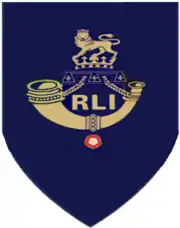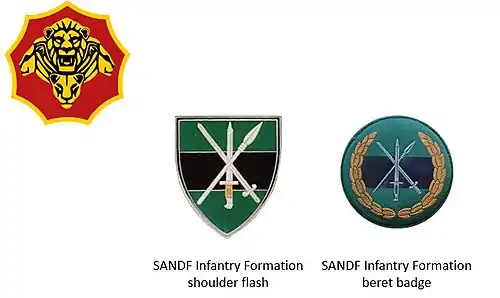Rand Light Infantry
The Rand Light Infantry (RLI) is an infantry regiment of the South African Army. As a reserve unit, it has a status roughly equivalent to that of a British Army Reserve unit or United States Army National Guard unit.
| Rand Light Infantry | |
|---|---|
 SANDF Rand Light Infantry emblem | |
| Country | |
| Allegiance | |
| Branch | |
| Type | Infantry |
| Role | Light Infantry |
| Part of | South African Infantry Formation Army Conventional Reserve |
| Motto(s) | Vincit qui patitur (He conquers who endures) |
| March | Quick: One and All and Trelawney Slow: Duke of York/Preobajensky Double Time: Keel Row |
| Engagements | |
| Battle honours |
|
| Website | http://1rli.wordpress.com/ |
| Commanders | |
| Current commander | Lt Col John Mellitchey |
| Insignia | |
| Company level Insignia |  |
| SA Motorised Infantry beret bar circa 1992 |  SA Motorised Infantry beret bar |
History
Origin
The history of this Regiment dates back to the Transvaal Cycle Corps, which was formed in Johannesburg on 1 October 1905 from the Bicycle Section of the Transvaal Scottish Regiment.[1] A small section of this unit subsequently took part in the suppression of the Bambata Rebellion in Zululand.[2][3]
After its return from this conflict the unit recognised the possibilities of mechanisation and members of the Regiment manufactured three armoured cars, creating a motorised fighting unit.[3] This led to the renaming of the unit in 1909 to the Transvaal Cycle and Motor Corps.[2]
On 1 July 1913 the Regiment was renamed the 11th Infantry (Rand Light Infantry) and transferred to the Active Citizen Force of the Union Defence Force.[3] Simultaneously, the unit was converted to a normal infantry regiment. The Regiment's Pretoria detachment was transferred to the 12th Infantry (Pretoria Regiment).[2]
World War One
During World War I the Regiment took part in the South-West Africa, suffering light casualties – only two dead and eleven wounded.[2]
In 1932 the Regiment was renamed the Rand Light Infantry.[2][3]
World War Two
The RLI was mobilized for World War II in June 1940 and gained fame in North Africa where it took part in many front line engagements and earned battle honours at Bardia, Gazala and El Alamein. (See 1st SA Infantry Division) After the defeat of Rommel’s Afrika Korps, the RLI returned to South Africa and was merged with the Duke of Edinburgh’s Own Rifles. The remaining members of the Regiment were trained in armour, and sent as reinforcements to the South African 6th Armoured Division in Italy.[2][3]
Border War
The Regiment took part in the South African Border War.[4]
Freedom of Entry
The RLI exercised its freedom of entry into Johannesburg on 9 November 2013 as part of the centenary celebrations of the City of Johannesburg with fixed bayonets, colours flying and drums beating.
Regimental Symbols
- Regimental motto: Vincit qui patitur (He conquers who endures)[3]
- The RLI were allied to the Duke of Cornwall's Light Infantry in 1932. This alliance later fell into abeyance but was resurrected in April 1995, when the Regiment became allied with The Light Infantry Regiment[3]: 22
- Regimental March: One and All and Trelawney.
- Regimental slow march: Duke of York and Preobajensky March.
- Regimental double march: Keel Row.
Previous Dress Insignia

Current Dress Insignia

Alliances
Battle honours
The RLI has been awarded the following Battle Honours:[3]: 21 South West Africa 1914-1915, Western Desert 1941 – 1943, Bardia, Gazala, El Alamein, Alamein Defence
| Awarded to Rand Light Infantry |
|---|
Leadership
| From | Colonels in Chief[3]: 40 | To |
| 1906 | Field Marshall, His Royal Highness, The Duke of Connaught KG KT GCSI GCMG GCIE GCVO | 1942 |
| 1947 | Her Royal Highness, The Princess Margaret | 25 October 2023 |
| From | Honorary Colonels[3]: 41 | To |
| 1910 | Col Sir William van Hulsteyn KT VD | 1939 |
| 1940 | Col A.D. Viney | 1968 |
| 1971 | Col G.B. Brown JCD MC | 1991 |
| 1992 | Col J.D.Vos SM JCD | 2012--> |
| From | Commanding Officers[3]: 42 | To |
| 1905 | Lt Col H.A. Woolf | 1909 |
| 1909 | Lt Col G.H. Hamilton-Dickson MVO | 1912 |
| 1912 | Lt Col J.M. Fairweather DSO | 1915 |
| 1915 | Lt Col W.J. Thompson DSO VD Croix de Guerre | 1920 |
| 1920 | Lt Col J.H. Blaney DSO DCM | 1922 |
| 1923 | Lt Col W.A. Abbott VD | 1925 |
| 1925 | Lt Col W.A.D. Cherrington VD | 1927 |
| 1927 | Lt Col H.E. Jackson DCM VD | 1931 |
| 1931 | Lt Col W.J. Endean MC | 1932 |
| 1932 | Lt Col A.A. Hayton DSO VD | 1937 |
| 1937 | Col J.O. Henrey MBE VD | 1942 |
| 1942 | Lt Col A.C. Thomas | 1943 |
| 1944 | Amalgamated with CTR | 1945 |
| 1946 | Lt Col C.D. Hancock ED | 1950 |
| 1950 | Cmdt W.P.F. Clark ED | 1955 |
| 1955 | Cmdt G.B. Brown JCD MC | 1962 |
| 1963 | Cmdt R.S. Munton JCD MM | 1966 |
| 1967 | Cmdt B.G. Simpkins JCD with 30 Yr Clasp MM | 1969 |
| 1969 | Cmdt J.D. Vos SM JCD | 1975 |
| 1975 | Cmdt A.B. Dalgleish JCD | 1977 |
| 1977 | Cmdt J.M. Smuts JCD | 1980 |
| 1981 | Cmdt C.E. Story JCD | 1983 |
| 1983 | Cmdt Kevin G.E. Mulligan | 1989 |
| 1990 | Cmdt B Durham | 1991 |
| 1992 | Lt Col S.J.Vos MMM JCD | 2002 |
| 2003 | Lt Col Haydon Goument JCD | 2005 |
| 2005 | Lt Col John Mellitchey DWD | 2016 |
| From | Regimental Sergeants Major[3]: 42–43 | To |
| 1906 | RSM E. Evans | 1910 |
| 1911 | H.A.E. Hall | 1914 |
| 1914 | S. Piggott | 1917 |
| 1918 | A.H. Miller | 1923 |
| 1924 | J.S. Porter | 1925 |
| 1925 | D. Suttie | 1925 |
| 1925 | R.G.B. Heydenrych | 1928 |
| 1929 | H.R. Lahner | 1942 |
| 1942 | G. Trobridge | 1943 |
| 1944 | Amalgamated with CTR | 1945 |
| 1946 | G.C. Webb | 1947 |
| 1948 | V. Dove | 1951 |
| 1952 | D.N. Rathbone | 1962 |
| 1963 | E.L. Hansen | 1964 |
| 1964 | WO1 J.H. Honey | 1967 |
| 1968 | WO1 J.L. Keene PMM JCD | 1979 |
| 1980 | WO1 S. Rogoff JCD | 1984 |
| 1985 | WO1 N.P. Wegener | 1989. |
| 1990 | WO1 PHR Wells MMM JCD | 2008 |
References
- D. J. Potgieter, M. A. (1973). Standard Encyclopedia of Southern Africa. Internet Archive. Cape Town. p. 240.
{{cite book}}: CS1 maint: location missing publisher (link) - "Rand Light Infantry" (pdf). rfdiv.mil.za. Reserve Force Division, SANDF. Retrieved 23 October 2014.
- Mulligan, Commandant K.G.E. (1986). RLI Guide for Officers. Johannesburg: Rand Light Infantry.
- Mulligan, Kevin (March 2009). Carry On Regardless. Durban, South Africa: Just Done Productions Publishing. ISBN 978-1-920169-87-9. Archived from the original on 4 September 2014. Retrieved 23 October 2014.
External links
- "RLI Webpage".
- RLI Roll of Honour Archived 3 March 2016 at the Wayback Machine
- "Rand Light Infantry Blog".
- "RLI Facebook group". FaceBook.
- "British Army". UK Ministry of Defence.
South African Army Units | |||||||||||||||||||||||||||||||||||||||||||||||
|---|---|---|---|---|---|---|---|---|---|---|---|---|---|---|---|---|---|---|---|---|---|---|---|---|---|---|---|---|---|---|---|---|---|---|---|---|---|---|---|---|---|---|---|---|---|---|---|
| Divisions and Brigades |
| ||||||||||||||||||||||||||||||||||||||||||||||
| Armoured Formation (SAAAFTooltip South African Army Armoured Formation) |
| ||||||||||||||||||||||||||||||||||||||||||||||
| Infantry Formation (SAAIF) |
| ||||||||||||||||||||||||||||||||||||||||||||||
| Artillery Formation |
| ||||||||||||||||||||||||||||||||||||||||||||||
| Air Defence Artillery Formation |
| ||||||||||||||||||||||||||||||||||||||||||||||
| Engineer Formation |
| ||||||||||||||||||||||||||||||||||||||||||||||
| Training Formation |
| ||||||||||||||||||||||||||||||||||||||||||||||
| Support Formation |
| ||||||||||||||||||||||||||||||||||||||||||||||
| Signals Formation |
| ||||||||||||||||||||||||||||||||||||||||||||||
| Disbanded or Amalgamated Units |
| ||||||||||||||||||||||||||||||||||||||||||||||